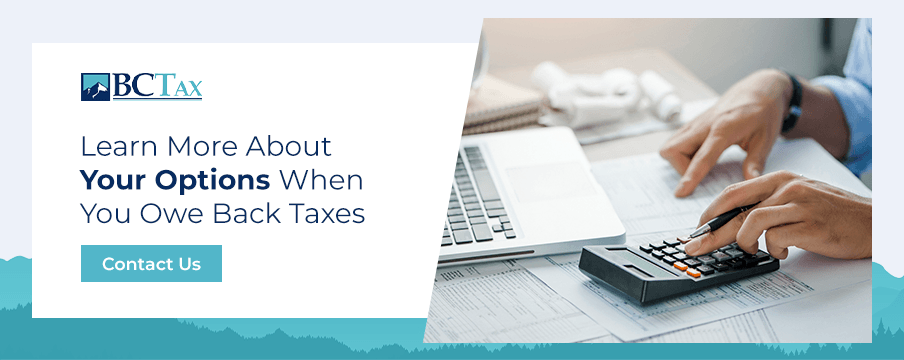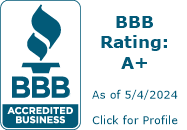The Internal Revenue Service (IRS), state treasuries and local governments uphold firm tax due dates. Back taxes are the funds you owe after you miss a due date or submit less than your entire balance.
Individuals and businesses accrue back tax balances for numerous reasons. Sometimes, your tax bill could be more than the amount taken from your paycheck each period. Failing to pay the balance when filing your tax return will result in back taxes. Back taxes also accumulate when a company or self-employed individual misses a quarterly estimate due date.
A tax balance can result in financial penalties, impact your credit score and prevent you from receiving your tax return. Back taxes and penalty fees may also accrue interest. Fortunately, there are various tax debt options when you owe back taxes. These common back tax solutions can reduce debt and preserve financial flexibility.
Options for Paying Back Taxes
Taxpayers can implement tax resolution options to resolve their back taxes. The IRS created the Fresh Start Program to provide back tax resolution options. These IRS initiatives and other solutions help taxpayers manage bills they can’t immediately pay and mitigate penalties.
Filing Extension
Requesting an extension is crucial if you know that you may owe more than you paid or could miss your filing date. The IRS allows taxpayers to apply for a filing extension up until the year’s filing due date. The extension would give you until a date in October to file your taxes, preventing fees for late filing, but you will still owe money by the original due date.
Payment Plans
Tax agencies present a back tax balance as a lump sum, which could amount to thousands of dollars. Reaching an installment agreement allows taxpayers to divide their balance into smaller payments. The IRS offers various payment plans, including short-term plans that defer payment for 180 days and long-term plans that involve monthly installments.
Offers in Compromise
An Offer in Compromise is an option for a substantial back tax balance. A taxpayer can submit an Offer in Compromise that details an amount that they can pay and a plan for paying that amount. The IRS considers income, expenses, asset equity and outstanding circumstances when determining eligibility and approving the financial amount.
Not Collectible Status
Another back tax repayment option involves temporarily delaying payment, interest and penalties. When navigating situations that inhibit their ability to pay some or all of their balance, a taxpayer can file for Currently Not Collectible (CNC) status, which may require completing a relevant Collection Information Statement form. This statement explains why the individual can not pay the debt. Situations that warrant not collectible status include those that cause economic hardship, such as unemployment, bankruptcy and health issues.
Penalty Abatement and Lien Relief
Tax agencies attach interest and penalties to back taxes, making resolution more difficult. They may also place a lien on the account, allowing them to take control of the taxpayer’s property and assets if the balance persists. Taxpayers can better manage their back taxes by implementing penalty abatement strategies or taking action to stop a tax lien. Options like the IRS First Time Penalty Abatement program or forming an installment agreement can alleviate compounding consequences.
Bankruptcy
In some cases, filing for Bankruptcy is the best solution for back taxes. Bankruptcy gives the taxpayer a fresh start, removing the tax debt but impacting their credit score. Most states offer Bankruptcy as a final option after a certain amount of time — often around three years.
Partner With an EA, CPA or Tax Attorney
With so many back tax resolutions available, taxpayers often turn to experienced tax professionals for guidance. Enrolled Agents (EAs), Certified Public Accountants (CPAs) and tax attorneys offer unique tax debt resolution capabilities applicable in different situations. These qualified, reputable professionals enact robust back tax solutions so taxpayers who owe can reach a manageable resolution.
Learn More About Your Options When You Owe Back Taxes
BC Tax is an organization committed to streamlining back tax resolutions for individuals and businesses throughout the United States. For more than 20 years, we have connected clients with experienced tax professionals who provide individualized services that result in manageable resolution plans.
Our expertise has significantly improved the financial situations of clients in various circumstances. One client in New Mexico achieved full tax abatement, while another negotiated an immediate $45,000 bill down to $50 monthly payments. We know what to do about tax debt and can apply our expertise to your case to achieve a favorable outcome.
Please contact us online to schedule an obligation-free consultation with BC Tax.

 1-800-548-4639
1-800-548-4639









